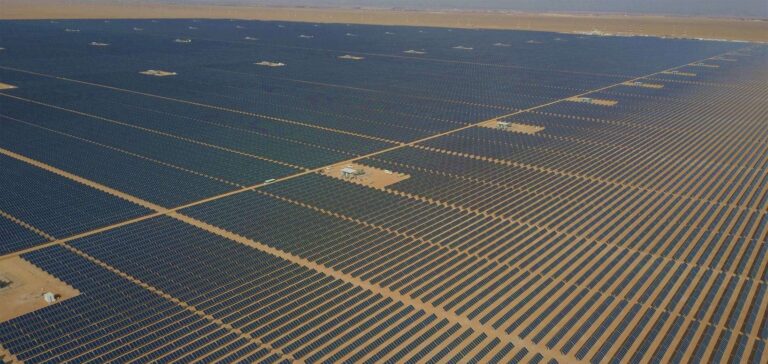On April 9, ACWA Power inaugurated the Sakaka solar park, Saudi Arabia’s first large-scale renewable energy project.
The 300 MW park will enable the Kingdom to enter the renewable energy market and decarbonize its economy, which is heavily dependent on oil and gas.
Solar park pivotal to Saudi energy diversification
The Sakaka PV IPP is set to generate 300 MW and is the first renewable energy project in Saudi Arabia.
The Saudi company ACWA Power is leading the project.
The company specializes in the energy industry and is the market leader in the country.
In 2018, a consortium led by ACWA Power estimated that the project would achieve a record tariff of $0.012/kWh.
A grand inauguration
The inauguration of the Sakaka PV IPP took place on April 9, 2021, attended by members and representatives of the government and ACWA Power.
It was supervised by the Crown Prince of Saudi Arabia, Mohammed Ben Salmane, accompanied by the Minister of Energy, Abdulaziz Ben Salmane.
In a speech, the Energy Minister stressed the fundamental importance of developing renewable energies in the Kingdom.
Clear socio-economic objectives
There are clear socio-economic issues behind the Sakaka PV IPP project.
It is part of Saudi Arabia’s national renewable energy program to reduce the cost of solar electricity.
It also aims to boost employment among Saudis.
Saudis made up 97% of the workforce when Sakaka was built.
A first step in Saudi energy policy
Nevertheless, Saudi Arabia has no intention of stopping investing in renewable energies.
Indeed, its ambition is to diversify its energy mix, improve efficiency and provide jobs for Saudis.
To this end, ACWA Power is developing its expertise internationally, in order to obtain skills and knowledge that can be applied in the Kingdom.
The Sakaka project, driving the energy transition
The success of the Sakaka park is designed to encourage Saudi companies to develop renewable energy projects.
Seen as a sector of the future, the renewable energy sector is one of the key points of the Kingdom’s socio-economic development.






















